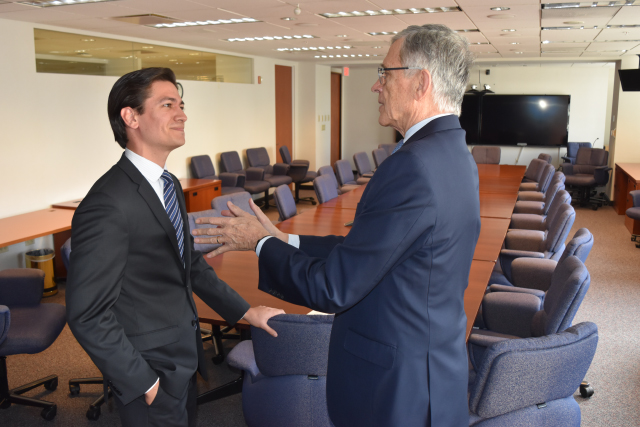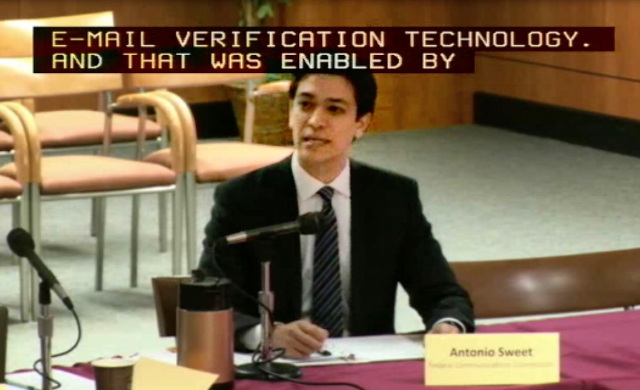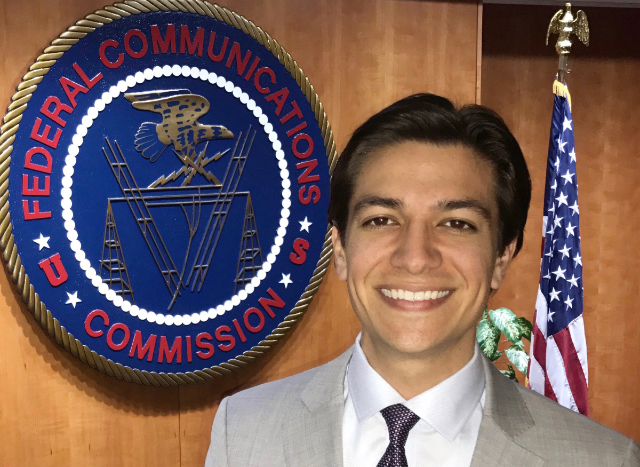Engineering communications policy at the FCC
Phone scammers claiming to be IRS agents demanding payment of back taxes have cheated more than 5,000 victims out of about $26 million since 2013.
Antonio Sweet, S.B. ’13, and his colleagues at the Federal Communications Commission (FCC) are fighting back against these fraudsters.
Sweet, who concentrated in electrical engineering at the Harvard John A. Paulson School of Engineering and Applied Sciences (SEAS), helped craft guidelines that telephone companies are now using to compare call metadata, such as the call’s location in a network, with the area code on the phone number. A mismatch, like a phone number originating from a foreign country for a supposed IRS call, instantly raises red flags.
“Because the network companies are now putting those pieces together, they can immediately block those calls from reaching the consumer as opposed to waiting for a consumer complaint after the fact and manually tracing the fraudulent call to the criminal,” he said.
In a recent pilot program, these FCC guidelines led to a 90-percent reduction in cases of the IRS phone scam, Sweet said.
That is one example of how the FCC collaborates with representatives from industry, legislators, and legal analysts to develop policy aimed at improving communications systems throughout the U.S.
As the FCC’s Technology Policy Advisor, Sweet provides advice and technical guidance for the agency’s Chief Technologist and other senior officials. Drawing on his background in electrical engineering, he conducts research, meets with subject matter experts, and presents his findings to colleagues on topics such as network architecture and transmission protocols.

Sweet discusses policy goals with former FCC Chairman Tom Wheeler. (Photo provided by Antonio Sweet.)
“In this job, you have to be as familiar with the law as you are with the technology,” he said. “I feel like I’ve had an on-the-job crash course in legal studies. It’s a constant challenge to take technical information and harmonize it with the legal team as we draft the language of these laws.”
One of the recent challenges the agency tackled centered on the issue of “net neutrality.” Sweet helped research and write the FCC’s Open Internet Order, a landmark set of consumer protections which established three pillars for internet service providers: 1) no blocking of a subscriber’s legal access to a web service; 2) no throttling (reducing the speed of access); and 3) no prioritization of traffic due to payment or affiliation between a web service and an internet service provider.
For Sweet, it was eye-opening to see how legislation moves through a deliberative political process. Net neutrality has been a focus at the FCC since 2002, but it only recently became a highly political issue that has divided telecom experts. When the issue was opened to public comment, the FCC was flooded with input.
“We received four million public comments, which shattered our record. It was a lot of information to dig through,” he said. “But to see that level of engagement from the public was incredibly heartening because it means people care about our work.”

Sweet delivers a presentation on robocall mitigation to a Federal Advisory Committee. (Photo provided by Antonio Sweet.)
As new communications technologies are introduced and popularized, there will be plenty of new issues for the FCC to grapple with. Sweet is particularly excited to play a role in crafting policy related to internet-of-things devices, next-generation satellite internet, and communication protocols for self-driving cars. He enjoys the challenge of keeping up with the latest technical advances, while also keeping track of the action on Capitol Hill.
He is also interested to see how the agency’s priorities change with the start of the new administration in Washington, D.C. While priorities always shift under new leadership, much of the agency’s work, such as blocking fraudulent robocalls, is not a partisan issue.
Though his day-to-day work does not involve building gadgets or developing software, Sweet has found a rewarding outlet for the problem-solving skills he developed at SEAS.
“There’s no coincidence that the word ‘code’ comes up in both engineering and law. Just like an engineer’s, the code that I’m developing is a set of instructions for the components in a complex system; it just happens to be for a commercial industry rather than a computer,” he said. “The key to successfully iterating that system is effective collaboration—working with teams across the public and private sector to promote technological innovation while maintaining safety and security for the people that use it.”
